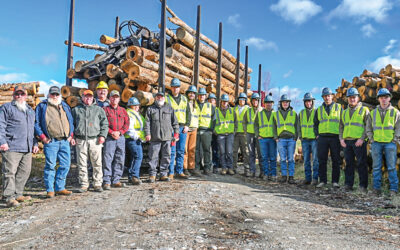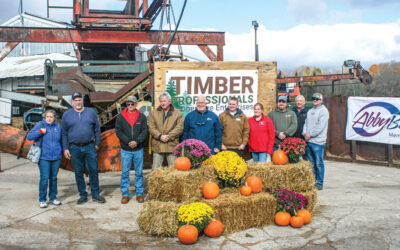Beginnings
Article by Dan Shell, Managing Editor, Timber Harvesting January/February 2022
 Way back in the 1940s my father was a local kid with smarts. Born into a farming family in Butler County, Ala., he grew up loving his family, the land, animals and hunting and fishing. He was even working his way into the timber industry: The folks running W.T. Smith Lumber in Chapman gave him a summer job learning to cruise and mark timber, and he planned to attend Auburn University and go into forestry. Problem was, a nearby fish pond in the tiny community of Brushy Creek intervened, and Auburn offered him a chance to make a career out of what he really loved—fishing.
Way back in the 1940s my father was a local kid with smarts. Born into a farming family in Butler County, Ala., he grew up loving his family, the land, animals and hunting and fishing. He was even working his way into the timber industry: The folks running W.T. Smith Lumber in Chapman gave him a summer job learning to cruise and mark timber, and he planned to attend Auburn University and go into forestry. Problem was, a nearby fish pond in the tiny community of Brushy Creek intervened, and Auburn offered him a chance to make a career out of what he really loved—fishing.
Once he went to Auburn and realized they offered a degree in fisheries and pond management, the forestry school plans went out the window. So did the nice job working outdoors in some of the prettiest pine timber imaginable: After the mill bosses realized he’d gone into fisheries, my father was reassigned to a sweltering green chain in the bowels of the mill in Chapman for his summer job. My grandparents also had to endure ribbing from the locals who’d say they thought Wayne already knew how to fish upon learning he had changed his major from forestry.
Daddy went on to an amazing career in fisheries, worked for Auburn University from 1959 to 1994, helped build the Southern U.S. catfish farming industry and traveled to more than 100 countries spreading the aquaculture gospel. But he never lost sight of the land and its people and how they interacted and influence each other. Steeped in America’s postwar can-do approach, he was well educated in agricultural inputs and outputs, and even more well versed in the circle of life.
But he would also do things like tell me one morning, when we were squirrel hunting in a magical place in northwest Butler County where soil types converge along the ancient Cambrian Ridge and create amazing geography and ecosystems, that “One day they’re going to clear-cut this place, and I’m gonna cry.” When you’re six or seven years old and the most powerful person in your world says something like that, you sit up and take notice. Of course, Daddy was no preservationist, but had a deep appreciation for the Creation and the sublime, of beauty and utility sometimes in opposition, and sometimes bound together.
In the early 1970s his father-in-law bought a “pretend farm” near Greenville, Ala. for when he retired a decade later, a place to relax and putter around with a truck farm garden and fruit tree orchard. (He wasn’t much of a true truck farmer since he ended up giving most of the produce away to friends and neighbors.) Meanwhile, Daddy was in hog heaven. He built a pond that’s still delivering fish and fun almost 50 years later. After convincing my grandfather no crops would grow on the sandy top of a large legacy field, he planted a couple acres of pines that are now 30+ years old and need harvesting. He helped coordinate getting the property logged and replanted. He planted wildlife mast trees around the property, and he mightily fought the kudzu that always festered in the railroad bed along one side of the property.
While Daddy came from a family of agrarians and buttoned down farmers, my mother’s side of the family were sawmill and logging camp people. Daddy used to tease Mama and call her a “city girl” because her family lived for a while in a little house on the north end of the Chapman mill town along the railroad tracks near the Rocky Creek bridge. Better to be upstream and upwind in those days, my grandfather used to say.
I have a great grandfather who worked in the W.T. Smith moulding shop and still have some of the cutters he designed. My grandfather worked logging camps in the 1930s, and a legendary family story is how my grandmother—simply the strongest woman I’ve ever known—drove her sedan into the middle of a logging camp in Mississippi and told my grandfather if he didn’t get in now and go back with her he wouldn’t have anything to come back to.
Back in Butler County, my grandfather went to work for Rocky Creek Logging Co., eventually rising to roads supervisor. In the era before the deer leases tied up seemingly every square foot of timberland, he had access to the best hunting spots imaginable. He also drove like a bat out of hell on those Butler County dirt roads shuttling between crews and job sites.
For a while when I was in high school, the setting was idyllic: one set of grandparents in the little Brushy Creek farmhouse where my father was born, the others living 20 miles away in Greenville with the “farm” outside town. We had a couple of trailers out there by the pond and while it was very down-home, it felt—and still feels— like our own private Lake Martin.
Even though the pond and trees and even one trailer are still there, most of the people are gone. As my father said on one of his last trips to Butler County before he died in May 2021, it’s turned back into a wild place now. My mother followed my father and died a month ago in mid December, and while I’m definitely looking for a better 2022 than last year, I’m also looking for more.
The little farmhouse on the road that dead ends at the Coastal’s Chapman plywood plant log yard is still there, passed to some cousins years ago but I’m welcome to visit and stay any time. I spend a lot of time at the little “farm” outside of Greenville, which has passed to my brother and I. Keeping the fields bushogged, the back of the pond dam clear, pretending to deer hunt—though my son does kill a few nice ones.
The land echoes with memories, people and events, and I can see the footprints, efforts of those I treasure who came before me, who put their mark on the land. At times I can feel the land and memories literally hold me.
So I look out at the pond and the pines and I worry about the bass overcrowding, the beavers pushing water into some of our timber or a wind event turning our little 25 acres of pretty pine trees into rotting downfall. It’s all on me and my brother now, and my children and their families as we seek to build a future that continues to honor our beginnings.
Latest News
Maine Logger Training Program Graduates Recognized
Maine Logger Training Program Graduates RecognizedUpon completing an extensive 20-week curriculum, graduates of the Mechanized Logging Operations and Forest Trucking Program (MLOFT) were recently...
Logger Co-op Launches Wisconsin Chip Mill
Logger Co-op Launches Wisconsin Chip MillA precedent-setting milestone was marked in Tilleda, Wis., with the launch of the United States’ first chip mill owned and operated by a logger cooperative—a...
West Fraser To Idle Mills In Georgia, British Columbia
West Fraser To Idle Mills In Georgia, British ColumbiaWest Fraser Timber Co. Ltd. announced in early November it will permanently close both its Augusta, Ga. and 100 Mile House, British Columbia...
WANT MORE CONTENT?
Spanning seven decades since its inception in 1952, Timber Harvesting highlights innovative and successful logging operations across the U.S. and around the world. Timber Harvesting also emphasizes new technology and provides the best marketing vehicle for the industry’s suppliers to reach the largest number of loggers in North America and beyond.
Call Us: 800.669.5613


